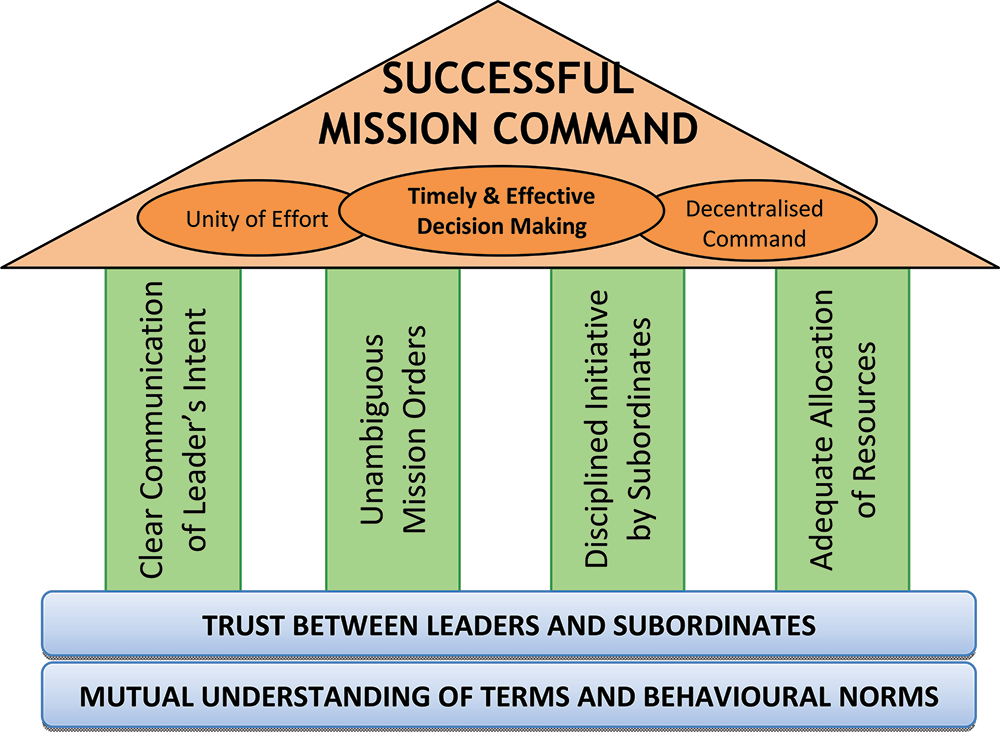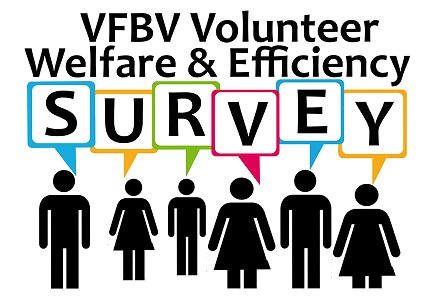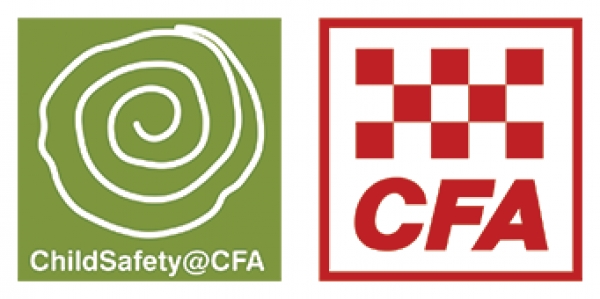Embracing Mission Command
By Adam Barnett, VFBV Chief Executive Officer
In last month’s column I referred to CFA’s ‘little red book’ and spoke of the contribution of CFA’s first full-time Chairperson Brigadier Richard Eason. As readers would be aware, I have long advocated a healthy respect for our past, and the fact that history provides context and objectivity to the present and should always inform our future. I love that adage of looking back to lean forward.
This doesn’t mean history or tradition should hold our future hostage, but a healthy respect, understanding and appreciation of our past ensures the hard lessons of our forebears are not wasted, and I often reflect on that old adage that those who don’t know history are doomed to repeat it. This has been particularly front of mind as we tally the significant loss of corporate knowledge leaving CFA over recent years and we embark on yet another ‘change’ journey.
One of the interesting things about the history of the little red book is that, while it is generally admired today, back when it was introduced it was controversial and there was pushback. It took several years for the dust to settle and for the strategies and tactics heavily influence by military doctrine to be accepted as relevant and appropriate for emergency management.
So too with Mission Command. The concept of mission command is not new, and in military terms dates back at least to the 1800s with the modernisation of the Prussian Army.
Mission Command is now widely adopted by the British, American and Australian defence forces to name just a few. Put simply, mission command is a concept of delegated command through clear and unambiguous understanding of the leader’s intent. It is a command and control philosophy that encourages the subordinate to exercise disciplined initiative within the leader’s intent to accomplish the objectives when faced with a dynamic and fast changing situation.
Within military circles, mission command was born from the truism that ‘no plan survives the first contact with the enemy’. This is just as relevant to emergency services as it is to the military.
If Eason was the father of the little red book, then ex- Chief Officer Euan Ferguson AFSM would be considered the father of Mission Command within CFA.
Euan was also responsible for promoting Mission Command to AFAC and its adoption by many fire services across Australia.
I was privileged in early 2011 to be approached early on by Chief Officer Ferguson who was seeking assistance to introduce mission command, and have CFA adapt and adopt it within the organisation’s operational doctrine.
And while early conversations with volunteers provided a broad and diverse level of both doubt and support, Euan did not give up and redoubled his efforts to educate and inform on the benefits to this command philosophy to the organisation.
Slowly it began to garner more and more support, and just as Euan intended, provoked thought, conversation and progression to better, safer and more effective command and control in emergency operations.
I also remember the good-natured ribbing we gave the Chief, who insisted on referring to mission command by its German translation of ‘Auftragstaktik’ emblazoned across the discussion papers. And while we joked that it looked like alphabet soup, I suspected Euan was very deliberately reminding us that this isn’t just some new fangled management speak, but a tried and tested philosophy worthy of our attention and adoption.
Sadly, it was thinking beyond its time. The progress and momentum of adopting mission command, and its direct links to strengthening the role of Group in local command and control arrangements was lost after Euan’s departure as Chief Officer. It is one of the great unfinished legacies we should grieve, and I’d suggest a part of our history that needs to be urgently resuscitated.
One of the reasons I so deeply admired Chief Officer Ferguson’s teachings on mission command was its potential to respect and maximise human creativity, initiative and diligence. At its heart was a philosophy that respected the human condition and acknowledged that doctrine should always enable and guide our response to emergencies - not hinder or frustrate.
When dealing with the criticisms of mission command and working to understand the perspective of its detractors, it was clear that it would take time to teach, embed and understand how the philosophies of mission command could best be adapted to the CFA context. It was widely accepted by Euan that mission command may not be applicable in every situation and has some limitations, but the benefits overwhelmingly outweighed the negatives.

Interestingly, in all discussions there was a recognition that CFA would have to undergo significant culture change to successfully embed the principles of mission command. At its heart, mission command relies upon; decentralised decision making; unity of effort; mutual trust and understanding; clear objectives and leaders’ intent, and timely and effective decision making.
Anyone with any knowledge of CFA processes and systems of work would appreciate instantly some of the cultural improvements we would need to work extra hard at to overcome. One only needs to look at our Standing Orders (SOs) and Standard Operating Procedures (SOPs) to gain an appreciation for the shift required.
Mission command was intended to reduce, simplify and focus SOPs for example, one of the capstone layers of our operational doctrine. Instead, over recent years they continue to grow, not just in number, but in length and complexity. Additions have introduced magnitudes of prescription that couldn’t possibly be expected to survive engagement with the enemy (the fire).
I attended a volunteer forum recently where some joked that one of the few redeeming qualities that our current SOPs provide is the mountains of paper now required to print them all out. The rationale being that there is a forest somewhere in the world that has had some of its fuel load reduced through the printing of today’s paperwork!
So why this trip down memory lane?
Simply put - mission command is just as relevant today as it was in 2011. The culture change required to build respect, trust and unity of effort within CFA I would argue is just as important, if not more important than ever. There are still embers or vestiges of mission command left from its original adoption. The Chief Officer’s annual fire season intent statements are a good example.
And while mission command is most relevant to incidents, and especially large incidents, its concepts, frameworks and key principles are highly suitable and adaptable to local command and our work to strengthen the role of group and empower and trust senior volunteer leaders such as Group Officers, Captains and Lieutenants.
Think of it from a brigade perspective and imagine an organisational culture that respects and trusts each of its brigade leaders and empowers them to work within clearly defined objectives where they can maximise the capacity and capability of each CFA brigade. A brigade with the freedom to shape and reflect each of the diverse and unique communities across Victoria they inhabit, but simultaneously reflects a common set of values, hopes and unity of purpose in putting our communities first and defending and helping them prepare for the ravages of fire and other emergencies all the while making the brigade a satisfying and even enjoyable place to volunteer and work.
And this my friends, is probably why mission command stalled. It isn’t a doctrine or a control system. It most certainly isn’t a world with no rules or a metaphorical free for all. It is a philosophy. One that has been very successfully adapted by organisations much larger than ours, and one that enables a diverse group of people to come together and solve complex tasks.
Most importantly, it puts the human (with all our faults and otherwise) at the centre, empowering and trusting the individual to best solve the problems at hand.
I can think of no better philosophy to embrace as we take these next steps on CFA’s change journey. If we don’t embrace the people part of our organisation and rebuild the trust and respect by the corporate CFA to our brigades and its members, then these changes will be as fleeting as many others.
This is also a reminder that our history teaches us that change is difficult. That shouldn’t stop change from being proposed but should inform boards, executives and leaders of the vital role they play in ensuring change is well articulated, understood and informed by grass roots. We also need to accept change is inevitable.
Only when everyone respects that the journey is just as important as the destination, will people embrace and open their minds to change, and that change will be long lasting.
MERRY CHRISTMAS
May I wish all members and their families a very special Christmas and New Year.
While this year has been long and difficult, CFA and other emergency management volunteers continue to demonstrate their unwavering commitment to the safety of all Victorian’s.
And as we prepare for another fire season and sacrifice precious time with our loved ones in service of our communities, I extend a very genuine thank-you and well done for all your efforts. We are proud of you and wish for everyone a safe and well-deserved break over the holiday period.
But should you be called out please stay safe and know how grateful and appreciative the public are of your efforts.
2020 VolWEl Survey – Have your say today!

The 2020 VFBV Volunteer Welfare and Efficiency Survey is now open for all CFA volunteers to take part.
The survey is an annual snapshot of volunteer opinion that contains 33 questions on issue chosen by CFA volunteers and takes only 10 to 15 minutes to complete. It is a critical tool in monitoring short-and-long-term trends in volunteer opinion and the effectiveness of initiatives aimed at improving CFA volunteer engagement and wellbeing.
As we move through the fire services reform process, it is critically important that all CFA volunteers have an opportunity to provide their views and have their voice heard, participating in the survey gives all CFA volunteers the opportunity to have their say. The results from the survey will help keep VFBV informed and assist in our advocacy on behalf of all CFA volunteers.
Visit the VFBV website to take part or scan the QR code below to take part in the survey today.
If you know of CFA volunteers who do not have internet access, VFBV can post out a copy of the survey for them to complete. Please contact your VFBV Support Officer or the VFBV office This email address is being protected from spambots. You need JavaScript enabled to view it. or (03) 9886 1141 and we will post a copy.

Child Safety Consultation
A reminder that consultation over proposed changes to two CFA policies and one procedure, relating to improving Child Safety are underway.
The draft proposals include a proposed requirement for new members to complete a working with children check as part of their application process when they join. Copies of the draft documents are available for volunteer feedback and review and can be accessed through the VFBV website. VFBV will provide a formal response to CFA after reviewing volunteer feedback. All brigades, groups and individuals are encouraged to contribute to this review and provide feedback.
Feedback is due back to VFBV by 11 January 2021.

Welfare Fund Deadline
Brigades are reminded that 31st December is the deadline for paying this year’s Welfare Fund subscription. Subscribing ensures your members are protected in the likelihood of needing emergency financial assistance if they find themselves in hardship due to loss of work, family illness or accidental injury.
Under the Welfare Fund Rules if a Brigade fails to pay its Welfare Fund subscription and their membership lapses, there will be a one year waiting period imposed should the brigade decide to re-join in the future.
Therefore, it is incredibly important for the protection of your members, that Welfare Fund subscriptions are kept current with payments received by VFBV before 31st December each year. Please contact your Brigade Secretary to ensure your brigade is up to date.
Last financial year a total of $273,237 in Welfare Fund grants were paid to volunteers in severe financial need across the state, and the support of the Welfare Fund is always gratefully received by brigades, and volunteers in their time of need.
VFBV Quarterly Supplement
Included in the December edition of Fire Wise was the fifth edition of the VFBV Quarterly Supplement.
The Quarterly Supplement contains 16 pages of relevant news, updates and information on current issues being pursued by VFBV on behalf of members. It also includes links to additional resources or updates that are available via our website.
An electronic copy of the Quarterly Supplement can be downloaded here.
Brigade Captains and Secretaries, Group Officers and Group Secretaries as well as VFBV delegates are requested to please take the time to read this and future editions, and to table at your meetings for the benefit and knowledge of your members.

Replacement PPC
Each fire season VFBV deals with a small number of reports that volunteers applying for replacement personal protective clothing (PPC) items have difficulty. State Council has resolved a zero-tolerance approach to these issues and that any member who has been denied replacement PPC are to log the incident in CFA Safe and approach your local District Council who will then escalate with CFA as a matter of priority.
All operational members are entitled to have PPC that is fit for purpose and in good working condition. When approaching District Council, members are requested to have a record of who has denied the request, and as much date and detail information as possible so that appropriate action can be taken. Any rejected applications for replacement PPC should be requested in writing, and best endeavour used to escalate internally for resolution first.
In most cases VFBV officials have been able to resolve the issue quickly and at the local level to the satisfaction of the member involved. Brigade Officers are encouraged to report any instances where members have not been provided appropriate replacement items within reasonable timeframes.
General Firefighter
VFBV delegates to the working party on General Firefighter (GFF) have been happy to see that the program has been prioritised by CFA and is currently being delivered in different parts of the State with mostly positive feedback being received.
CFA has reported that over 800 members are already enrolled in more than 120 registered courses.
VFBV is continuing to work with CFA on the eLearning component of GFF to ensure the flexible and adaptable delivery of the program and has raised concern over expected timeframes. Delegates are still concerned that in some areas Districts have not been pro-active and haven’t been engaging with local volunteer Trainer and/or Assessors when organising much needed courses or engaging with Groups and Brigades to ensure that briefings and handover sessions are being completed and target at cohorts.
VFBV encourages Training officers who are unsure of what GFF is or the lack of courses to please raise this with your local delegate or VFBV District Council so it can be escalated to the Joint Training Committee.
Training Restrictions Easing
Many would be aware that COVID-19 has forced CFA into restricting many activities resulting in training acquisition courses being postponed or cancelled throughout 2020. It has been positive to learn that following public easing of restrictions, CFA skills acquisition courses can now start with CFA confirming that skills acquisition can go ahead throughout the summer period providing that there is maintained capacity and the training can be done in a COVID-Safe manner.
VFBV welcomes this news and will monitor the situation as we understand that many Brigades are finding that restrictions have created a backlog and the difficulty in being able to upskill members over recent months, especially in vital training such as Breathing Apparatus. VFBV can also confirm that CFA’s position is that skills acquisition training can continue throughout the Fire Danger Periods with CFA committing to ensuring that Instructors will be made available anywhere in the State when and where required.
2021 State Championships
Urban Juniors
Mooroopna, 20 and 21 March
Urban Seniors
Mooroopna, 27 and 28 March
Rural Seniors
Mooroopna, 27 March
Rural Juniors
Mooroopna, 28 March
State Junior Championship hosts
Any Brigades/Committees interested in hosting a State Urban Junior Championship during the years 2022 to 2024, are invited to lodge an Expression of Interest to VFBV. VFBV strongly encourages all Brigades/Committees to consider their ability and willingness to host a State Junior Championship to ensure the continuation of our competitions.
Expressions of Interest to be forwarded to This email address is being protected from spambots. You need JavaScript enabled to view it. or faxed to 03 9886 1618 by Friday 29 January 2021.
Any queries or information can be obtained from the VFBV office on 03 9886 1141 or to This email address is being protected from spambots. You need JavaScript enabled to view it.
Independent Advisory Committee - Applications Sought
Earlier this month, the Victorian Liberal/National parties announced the commencement of community consultation to engage directly with CFA volunteers and other key stakeholders in the development of its fire service policies.
As part of this broad consultation, they are establishing an independent CFA Advisory Committee chaired by the former counsel assisting the 2009 Victorian Bushfires Royal Commission and Ex-Supreme Court Judge the honourable Jack Rush QC.
The independent panel will provide recommendations on future policy informed by consultation with volunteers and extensive experience within Victoria’s emergency services. VFBV has been invited to nominate three suitably qualified and experienced CFA volunteers to participate on the independent panel.
In accepting the invitation to participate, the VFBV Board has noted that the panel is independent, all members are participating in a voluntary basis, and the panel sits outside any formal or established political or party frameworks ensuring its independence.
VFBV is apolitical and encourages bipartisanship on all matters involving the fire services. This means on matters that involve legislation and policy we strive to work with all parties and all sides of politics to represent the views, concerns, and aspirations of CFA volunteers. In much the same manner that VFBV participates in Government sponsored panels, committees and working parties, VFBV will consult with any parties that wish to support CFA and CFA volunteers. Our obligation under the Volunteer Charter is to act as the elected representatives of CFA volunteers on all matters which may impact upon them, and this includes future policy development. We have communicated with every sitting Member of Parliament several times this year already.
We are now seeking applications from any CFA volunteer who feels they could positively contribute to the independent advisory committee.
Applications need not be lengthy but should include a current resume (or half page bio), a summary of your CFA experience and achievements that will help you contribute, and a brief letter outlining:
- Rough estimate of the size and reach of your consultative networks
- How you inform yourself of broader CFA volunteer views outside your immediate Brigade
- A brief summary of key issues and topics you feel the Committee should consider
- And any further information you feel is relevant.
Applications should be addressed to:
VFBV
C/- Nominations Panel
9/24 Lakeside Drive
Burwood East VIC 3151
Or via email This email address is being protected from spambots. You need JavaScript enabled to view it.
Applications will close on the 15 January 2020. Further details are available on the VFBV website.
Get Involved
VFBV is the CFA volunteer peak body and the voice for CFA Volunteers enshrined within the CFA Act to advocate and represent volunteers on all and any issues that affect volunteers within CFA. VFBV have multiple structures in place from local level to State level to ensure that your voice is heard.
VFBV encourage all volunteers to access and complete the annual VFBV Volunteer Welfare and Efficiency Survey. This survey is a critical feedback loop and assists us to understand the areas that volunteers want us to advocate for. The results of the survey are public and are presented in detail to Government, EMV and CFA.
This year’s survey will be closing soon. Please visit the VFBV website to complete the survey, or use your phone camera to scan the QR code below to bring it up on your phone or tablet.
We also encourage all Brigades and members to get involved in local VFBV District Council and raise any and all issues that you are facing or ideas on ways to improve CFA. Issues raised or ideas can then be escalated locally or, depending on their nature raised at State Level Committees for advocacy directly with CFA leadership.
For example the VFBV Training Committee has advocated extremely hard on a large number of trainings issues and initiatives over the years and continues to reach positive outcomes with CFA to improve training for Volunteers.
We want to hear your issues and ideas and encourage you to raise these with your local VFBV District Councils in the first instance.

Recent articles on the VFBV website
NOW OPEN – 2020 VFBV Volunteer Welfare & Efficiency Survey
16 Days of Activism Against Gender-Based Violence
COVID-19 Financial Support Resources
Enjoy the VFBV monthly newsletter?
If you enjoy reading the VFBV newsletter each month, why not share it with your fellow volunteers?
Either share this page with others who may enjoy the articles or encourage other volunteers to sign up to receive their own copy each month here.
 News
News 
